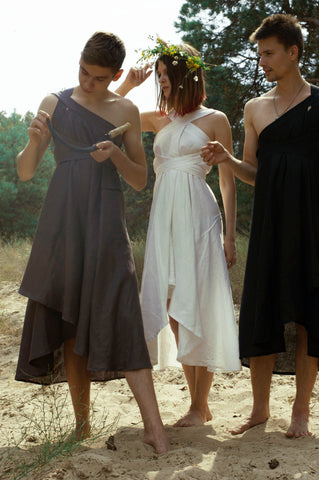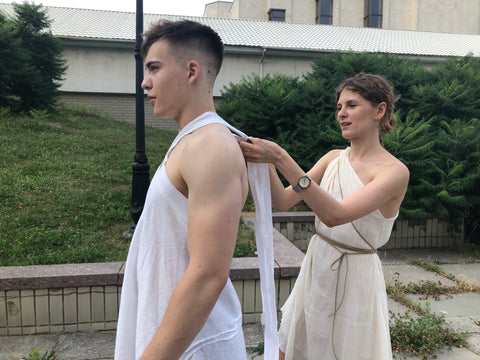Fashion Breaks The Mold: An Interview with Svitlana Volkova for Italian platform IMPAKTER


What inspired you to start your own fashion brand?
I’m a fashion designer but I have a background in civil activism. I have experience working in the public sector, which is a very important part of my life and a huge influence on my design philosophy. I started my activism at 18 years old working on various cultural heritage projects in Ukraine, like preserving centuries old buildings and creating cultural education programs for school children in the regions of Donetsk and Luhansk. I was the creator of the fashion program and taught kids how to build their brand. Today, I’m still involved in a number of different cultural activities and contribute to some international projects.
You describe Svitla Volka design as a “holistic sustainable brand”. What does this mean and how is it reflected in your clothes?
It’s holistic in two senses. The first reflects the basic definition of holistic as something integral and in its entirety. As a design team, this means making sustainability the foundation of everything we do.
Secondly, we have a motivation to change the world, but the world is already changing inevitably. I truly believe that if we move with the current instead of reacting against it, we can influence this change to be for the better. I don’t know if you have ever seen the television series Dirk Gently’s Holistic Detective Agency, but the idea that everything in the universe is interconnected really resonated with me. So that’s also what we mean by holistic – interconnectedness.
What are the core principles of your brand and how is this reflected in your clothes and how they are made?
I never wanted to make clothes where the brand could be easily identified, I like clothes where you’re clueless as to who made it. I set out to be a brand that everyone can adapt for themselves as a unique form of self-expression. I’m really not interested in brand recognition.
In terms of production, I used to work as a tailor, and it was honestly the worst period of my life. I worked in a rented apartment, I barely had any space and I worked with poor lighting. As a result, I developed back and eye problems and I was always exhausted. I decided that if I ever build my own clothing brand, I would make sure to provide the best working conditions I could. I want the people I work with to put all their energy and excitement into making the clothes, so that not only are our customers happy but my team is too.
I have a big team, but most of them work on a part-time basis. Only a handful of my administrative staff are full time. My brother is the Chief Administrative Officer and he helps with absolutely everything. If anything goes wrong, I call on him. He also helped fund the brand. We started with 2000 dollars and grew organically. I have one seamstress that works with me on developing new patterns and designs. Some of the factories we work with are in other cities, but we do regular checks on them. This has been really difficult with Covid restrictions though, so in order to have oversight and control over everything, we’re considering moving all our manufacturing in-house.
We work with certified organic linen from Belarus. It’s one of the most sustainable fabrics because it requires less water than cotton. Most of the linen found on the European market is grown in Belarus, the country is one of the biggest exporters of raw linen.

With the adoption of the UN 2030 Agenda and the 17 Sustainable Development Goals in 2015, sustainability is an essential guiding principle for businesses everywhere. What were some of the key learnings from your own path to sustainability and what are some of the future challenges you anticipate as the fashion industry responds to the greater demand for sustainable products.
That it’s difficult to be truly sustainable. I also don’t believe in competition. I think all sustainable brands have to work together to achieve a more equitable future for fashion. One way I’m doing this myself is by working on a fashion tech startup, a crowdfunding platform that works as a kind of Kickstarter for fashion designers. It will help designers make only the clothes that they know will be sold, thereby removing risk and the problem of overproduction.
Essentially a designer can make a digital version of a garment that someone can buy for their virtual world, but they can also order the physical version which will be created when the designer has collected enough money to make it. It’s essentially a platform that allows designers to validate their ideas, allowing them to grow in a sustainable way.
Editor’s Note: The opinions expressed here by Impakter.com columnists are their own, not those of Impakter.com. — In the Featured Photo: Svitlana Volkova Featured Photo Credit: Svitla Volka Design team
Clara Aseniero
Recourse: Impacter
